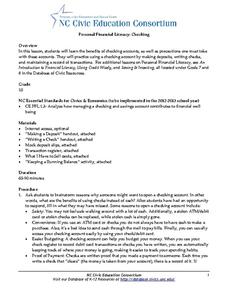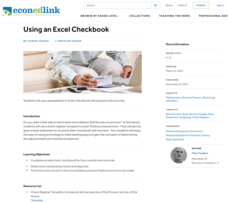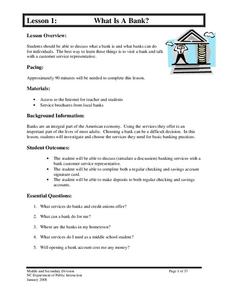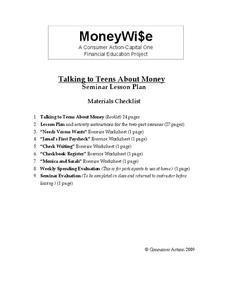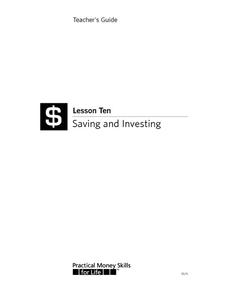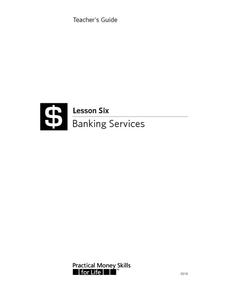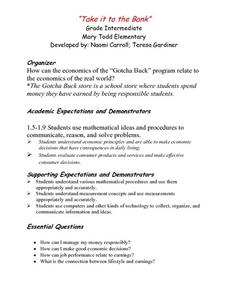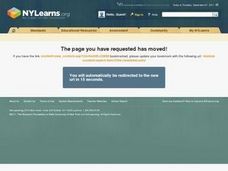Federal Reserve Bank
It's Your Paycheck
Beyond reading and arithmetic, one of the most important skills for graduating seniors to have is fiscal literacy and responsibility. Start them on the right financial track with nine lessons that focus on a variety of important personal...
Federal Reserve Bank
Cash the Check and Track the Dough
From checking and savings accounts to learning the importance of maintaining records and balancing a bank account, prepare your students to become financially independent and savvy adults, and explore all the intricacies of owning a bank...
Center for Literacy and Disability Studies
Personal Financial Literacy: Checking
After researching local banks and the checking account benefits offered by each, class members practice filling out a deposit slip, writing a check, and keeping a transaction register.
Beyond Benign
Final Budget
Be sure you have enough money to build a house. The 14th lesson plan in a 15-part series teaches young learners to use checkbook registers. They write checks for the amounts they spend on various housing materials and keep track of...
Texas Education Agency (TEA)
Piggy Bank vs. Bank – Choosing and Maintaining Your Account
Cha-ching! Using the practical resource, scholars investigate the different types of bank accounts and banking services available. Pupils view a PowerPoint, practice writing checks, and complete a checking account research project.
Council for Economic Education
Using an Excel Checkbook
High school is the time that many scholars get their first jobs. Help young entrepreneurs apply economic principles to crucial skills for their new jobs and for functioning in society in general. They use Excel to balance a checkbook by...
Federal Reserve Bank
Lesson 2: In the Aftermath
Don't wait for a crisis to get your finances together. An economics lesson demonstrates the importance of understanding crucial documents, banking basics, and financial tools with the focus on Hurricane Katrina in 2005 and its effects.
North Carolina Department of Public Instruction
What Is A Bank?
You're never too young to learn about banking and personal finance. Use a set of seven banking lessons to teach middle schoolers about checking and savings accounts, interest rates, loans and credit cards, and safety deposit boxes.
Wells Fargo
Hands on Banking
Encourage middle schoolers to be proficient and knowledgeable in the economic world with a series of personal finance lessons. Focusing on banking, credit, budgets, and investing, the activities guide learners through financial literacy...
Consumer Action
Talking to Teens About Money
Your teenagers are probably very good at spending money, but how good are they at managing it? Teach class members about banking, checking accounts, interest rates, car insurance, and many other relevant concepts with a series of...
Wells Fargo
Hands on Banking
What happens to your money between the time you make a bank deposit and the time you decide to spend it? Take middle schoolers and teens through the process of opening checking and savings accounts, creating a personal budget,...
Practical Money Skills
Using Banking Services
Using a bank is a privilege and a responsibility for young consumers. Teach them the important terms and details about creating accounts, using an ATM, and maintaining a credit card.
Visa
Saving and Investing
Impress upon your young adults the importance of saving and investing, and give them a foundational vocabulary from which they can continue to build their financial literacy. This lesson plan covers short- and long-term budget goals,...
Visa
Banking Services
From writing and depositing checks to comparing ATM and debit cards, pupils develop financially savvy practices and build foundational knowledge of the financial service products available through banking institutions.
Federal Reserve Bank
A Penny Saved
Budgeting, net vs. gross pay, savings, and fees are all key elements of personal financing and essential for your class members to learn about as young adults.
Federal Reserve Bank
Banking on Debit Cards
What are the advantages and disadvantages of using a credit card versus a debit card? What are the costs of using a debit card irresponsibly? Here you'll find a lesson on key concepts that every learner should know regarding personal...
Curated OER
Money Management Part II: Checking Accounts
Having money is great, learning to manage it wisely is imperative. First, the class has a discussion on the value and convenience of having a checking account. Then, they practice filling out deposit slips, keeping an account register,...
Curated OER
Financial Institution Comparison
Once learners are ready to choose a bank, how do they make a smart decision for their financial needs? Scholars help each other by jigsawing the research in groups. After introducing checking and savings accounts with the attached...
Curated OER
Take It To the Bank
Examine how the economics of a school store relate to real world economics. Elementary students explore various websites, complete a Venn diagram, create a schedule of wages for the students, read the book "A Chair For My Mother" and...
Finance in the Classroom
Unit on Checking
As part of a four-lesson unit on personal finances, class members practice using a checkbook. Exercises include writing checks, filling out deposit and withdrawal slips, and keeping a check register.
Curated OER
The Nitty-Gritty of Checkbooks
Students explore how to maintain a checking account. They control, disburse money, and keep their checking account balance. Through a PowerPoint demonstration, video streaming and hands-on practice, students apply the information given...
Curated OER
Spending Money
Fourth graders become familiar with the ways people exchange goods and services. In this spending money lesson, 4th graders listen to a chapter from Henry and Beezus and record Henry's earnings and money spent. Students use correct...
Curated OER
Checkbook
High schoolers examine how to balance a checkbook. In this economics lesson, students demonstrate that they can balance a checkbook by completing an activity that includes a check register and bank statement.
Curated OER
Decimals: checkbook and money
In this decimal worksheet, students complete problems having to do with a checkbook, money, the cost of items, and more, with numbers containing decimals. Students complete 3 problems.




